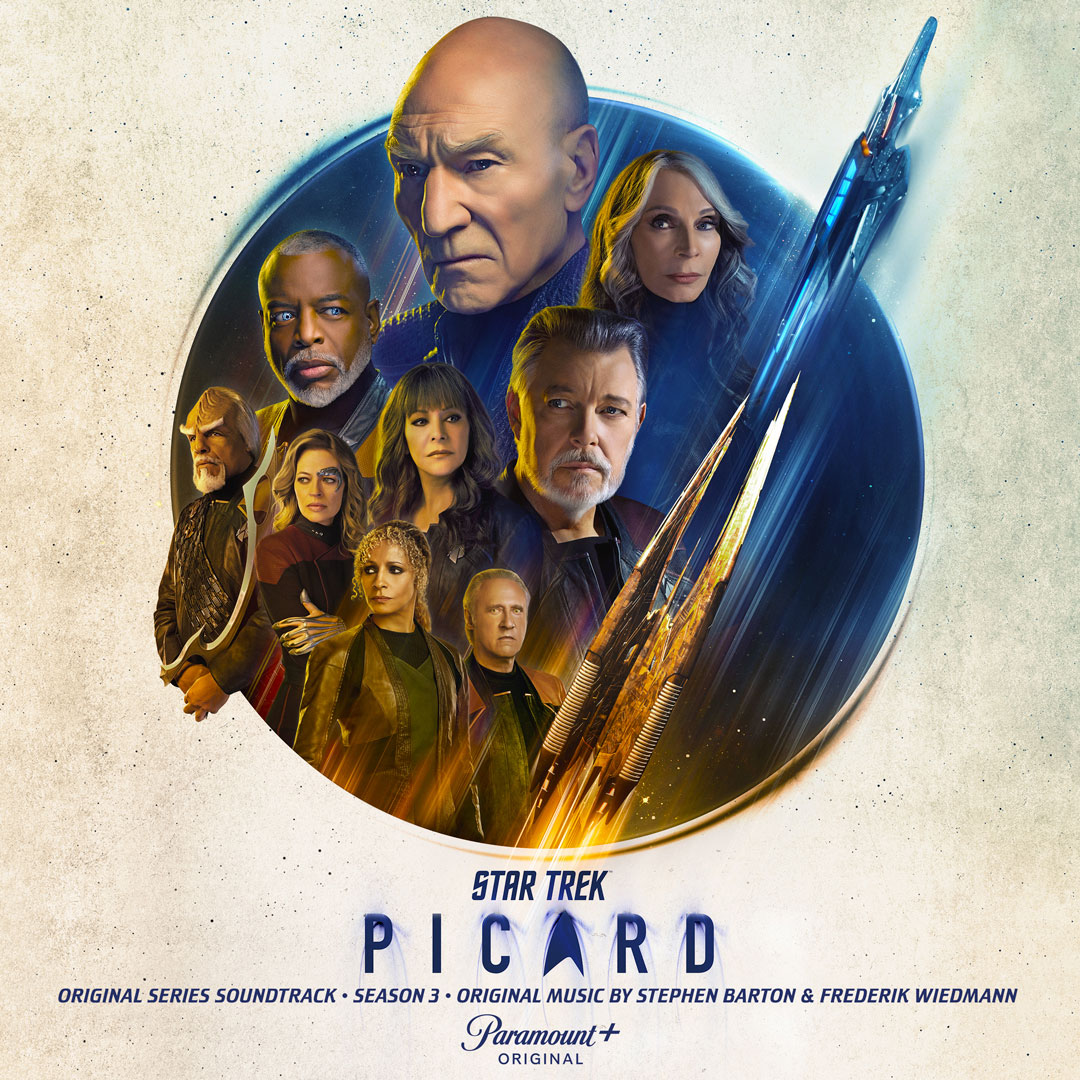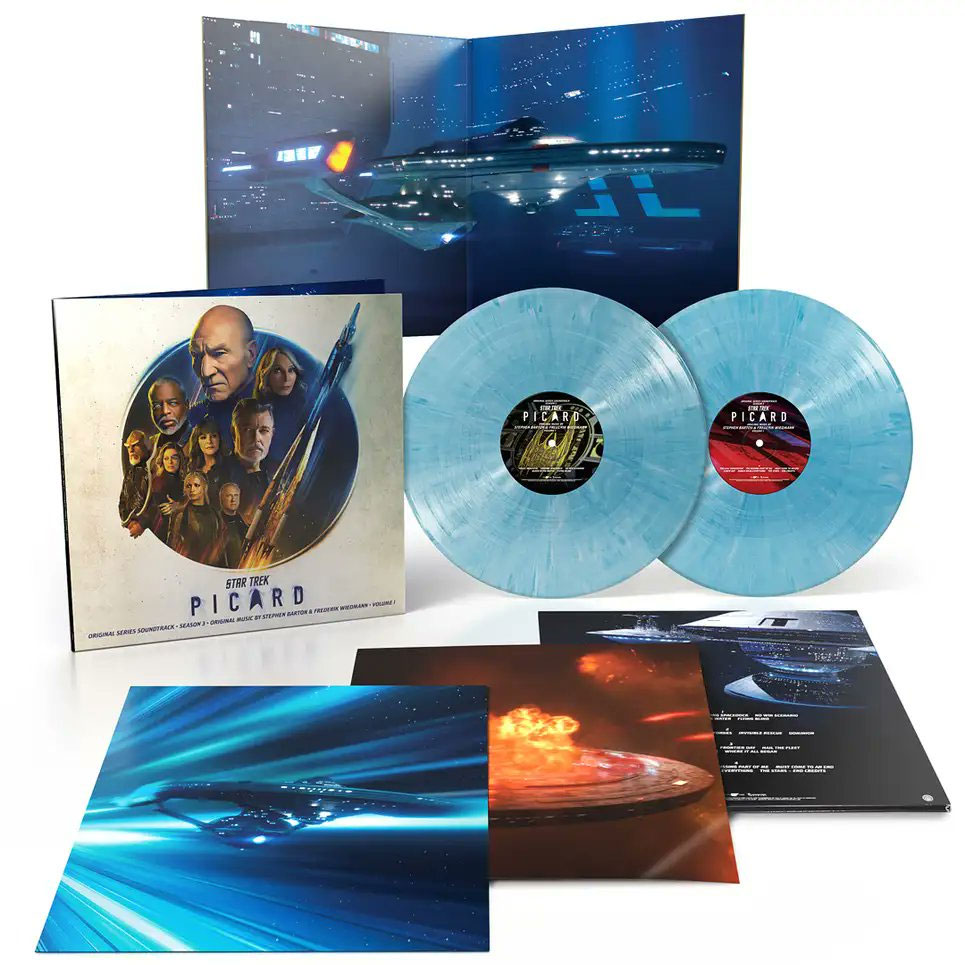One of the highlights of Star Trek: Picard’s third and final season — aside from the reunion of the Star Trek: The Next Generation crew — has been the sweeping, cinematic musical score which has accompanied each episode of this year’s adventure.
Series composer Jeff Russo departed the show after Season 2 — and new composers Stephen Barton and Frederick Wiedmann took charge of musical efforts for the series’ final outing.
We caught up with the pair at the Star Trek: Picard Season 3 premiere in February, where we discussed their point of view on the show’s new musical identity, nailing the right version of the theme song used in the show’s closing credits, and referencing existing Star Trek themes properly in this new modern context.
Finally, we’ve also got the details of Season 3’s official soundtrack release, coming April 20!
TREKCORE: One of the standout things to me through the first six episodes is the score for the season. It’s got a real classic feeling — compared to the classic films and the older shows. What was your edict, or were you given an edict when you guys came on board for Picard Season 3?
STEPHEN BARTON: I think I think the biggest thing was — well, the first thing was, when I saw it had pretty much already been shot. I was on set a few times, so I think the biggest edict was a personal edict of “Don’t screw it up.”
Because, you know, when you watch… I’ve been on shows where you watch it and you’re like, “Eh, it’s pretty good.” This one, you watch it. I just sat and I binged and I watched it three or four times, and I’m like, “Oh my goodness me, this is really good.” So I think that was a big one.
But I mean, musically, for me, I think it was a little bit about bringing the sort of naval thing from Wrath of Khan and some of what James Horner brought, as well as obviously, the Jerry Goldsmith theme. But a bit more of that sort of militaristic feeling. Weaving that into it in a way that didn’t feel like it was sort of a time warp but in a way that felt sort of right for now, kind of.
I mean, [showrunner Terry Matalas] and I often talked about, like, what would James Horner do if he were here now? Kind of thing. And I think that was a lot of the approach. Yeah.
FREDERIK WIEDMANN: I think the big challenge was, times have changed slightly since The Next Generation was on the air. So how do we take this material and bring it into this current aesthetic of filmmaking without it feeling that we’ve pushed it too far into something modern, but still having the nostalgia feel alive and stay in the spirit of what fans want and want to go back to.
Here is the brilliant @ComposerBarton conducting his Titan theme with all those wonderful nods to Horner in his arrangement. String section only. It’s been stuck in my head for over a year. #StarTrekPicard pic.twitter.com/f5YCKXI6MS
— Terry Matalas (@TerryMatalas) March 4, 2023
BARTON: The biggest part of it for me also, is the themes. You have to use and treat them like absolute nuggets of gold. And one of the things you can’t do is plaster them everywhere. You can’t literally use them like the wallpaper on some kid’s bedroom or something.
We want to have that sort of sense of like we’re telling a story and not just sort of going… you don’t want the music to be a commentator the whole time going, “You’re watching Star Trek!” “Did you forget you’re watching Star Trek?” I mean, we get it. We know.
So it’s using them in a very respectful way and then sort of finding ways to develop them.
Because, I mean, that’s the other thing. Every time you look at Jerry Goldsmith’s work, in particular, every movie, he found a new way of putting a spin on it. When we re-recorded certain pieces of music — because there are a few — we would go back and I would look at the movies and they were different speeds in different movies and go back and say, “Okay, well, do we want to be the speed from Nemesis, or do we want to look at this? What are we trying to say with this?”
TREKCORE: Yeah, because certainly, like in the end titles, you use the main theme from Star Trek: First Contact, but then you also use the theatrical film version of the Next Generation main title theme.
BARTON: The funny thing is where we’ve recorded any of those [with the orchestra] and some of the players had played on those movies, and it was one of those things where they would just sit there — our French horn player is a fabulous French horn player, he’s the principal of the Hollywood Bowl, a guy called Dylan Hart. And you could just see every time he came up on the sheet music in front of him, we looked over at him and he just smiled back and it’s like, “Okay, this is going to be fun.”

TREKCORE: But I also noticed along the way, especially in “The Bounty,” there’s things like that little thread of the STAR TREK IV theme — just a little nugget along the way.
BARTON: Well spotted, firstly!
TREKCORE: Well, it’s one of my favorite films. Was it a challenge to use any of that score that was produced for film in a television production. Was there stuff where we had to fight battles?
WIEDMANN: I don’t think at all, because all of this is so timeless to me, at least. And musically speaking, none of it feels old or dated — so whatever we were given as material to use and incorporate, it felt very natural and organic.
BARTON: From just a standpoint with Paramount, I think it was one of those Paramount-CBS things, they both realized what we were trying to do. It was one of those ones if you show, not tell. And we sort of said, okay, there’s certainly moments specifically in [“The Bounty”] where we come back to five separate themes — and so, it’s like you couldn’t not do that.
I mean, if we didn’t do that, it would seem like a sort of disservice. But I mean, part of doing that was also then to say, how do you present it in a way that honors it and isn’t just like hitting a button exactly like a needle drop? And so I think a lot of what we did was look at the heart of why those tunes worked and what they were saying.
Particularly with Voyager’s tune, I think that was one that every time… we don’t use it much, but when we do use it, we want it to mean something.

TREKCORE: There’s a lot of contemporary needle drops, as you put it, in the first several episodes as well. Were you involved with any of those choices or is that separate from your department?
BARTON: Most of those are courtesy of Drew Nichols, our editor, who is also one of the most phenomenal music editors. He’s someone who’s able to cut those and really choose incredibly well.
Especially source music for Liam Shaw for the dinner sequence and a couple of the other scenes where you really want it to say something — it’s not just background music, but you’re sort of saying something about the character. And he understands that innately. So most of that was in when we got there.
This interview has been lightly edited for clarity.
* * *
Lakeshore Records has announced the release date for Star Trek: Picard’s Season 3 soundtrack, a whopping 45-track collection of score from composers Stephen Barton and Frederick Wiedmann.
Arriving digitally on April 20, 2023 (coinciding with the Picard series finale), the extensive collection of music spans the entire ten-episode run of the show’s final adventure. There will also be a special vinyl release for the Season 3 soundtrack:
You can pre-save the digital soundtrack release here through Spotify, iTunes, and deezer, and check out the full track listing below.
1. Beverly Crusher (3:02)
2. Old Communicator (1:58)
3. Hello, Beautiful (1:57)
4. Leaving Spacedock (3:44)
5. I Like That Seven! (3:29)
6. Breaking the Beam (3:59)
7. The Shrike (3:34)
8. Picard’s Answer (4:08)
9. Riker and Jack (2:08)
10. Call Me Number One (2:02)
11. No Win Scenario (3:57)
12. Blood in the Water (2:58)
13. Let’s Go Home (3:24)
14. Flying Blind (5:51)
15. A New Family (4:16)
16. Klingons Never Disappoint (5:32)
17. I Do See You (5:26)
18. Legacies (3:15)
19. Evolution (2:44)
20. La Forges (2:08)
21. Invisible Rescue (3:34)
22. Catch Me First (2:32)
23. Proteus (3:46)
24. Dominion (7:04)
25. Lower the Partition (3:38)
26. Get Off My Bridge (4:26)
27. Family Reunion (3:17)
28. Impossible (1:37)
29. Frontier Day (2:43)
30. Hail the Fleet (4:03)
31. You Have the Conn (3:44)
32. Make It So (6:02)
33. This Ends Tonight (3:07)
34. Battle On the Bridge (2:58)
35. All That’s Left (2:02)
36. Annihilate (3:05)
37. Trust Me (2:06)
38. The Last Generation (2:51)
39. Where It All Began (2:19)
40. The Missing Part of Me (4:30)
41. Must Come to an End (1:32)
42. A New Day (3:22)
43. Legacy and Future (1:44)
44. Names Mean Everything (1:43)
45. The Stars – End Credits (2:59)
![]()
Star Trek: Picard Season 3 will continue with “Dominion” on March 30 on Paramount+ in the United States and on CTV Sci Fi Channel and Crave in Canada — following the next day in the UK, Australia, Italy, France, Germany, Austria and Switzerland. The series is also available on Amazon’s Prime Video service in most other international locations.


